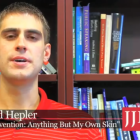
Benjamin Chambers On Why Treating Teens for Substance Abuse Issues Matters
|
Does it really matter if we screen and assess teens for alcohol and drug problems? Most adults, after all, started experimenting with alcohol or other drugs before they turned 21 -- and if they didn't, they almost certainly knew a lot of kids who did. And most of them (though not all) survived into adulthood. So what's the big deal if we turn a blind eye to identify teen drinking or drugging? Federally-funded research shows why it's a big deal from a public health standpoint:
(Click the image for a larger view.) It's taken from an excellent presentation, "Characteristics, Needs and Strengths of Substance Using Youth by Level of Involvement in the Juvenile Justice System," given by Dr. Michael Dennis, Senior Research Psychologist at Chestnut Health Systems, at the Reclaiming Futures Leadership Institute held in Miami last month. I'll be posting more slides from his presentation soon - stay tuned! Here's Dr. Dennis' notes on the slide (emphasis added):
This figure shows ...






